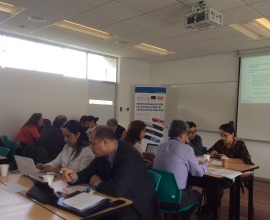Comparative study on the institutionalisation of evaluation in Europe and Latin America
The study represents an important contribution in terms of formalisation of the Public Policy Working Group formed in Lima in March 2015
Evaluation systems, both in Latin America and Europe, are currently immersed in change processes linked to the regeneration of political systems, in all cases attempting to make public management more transparent and provide accountability to an increasingly well-informed citizenry that makes use of new social participation channels.
In this context, the EUROsociAL II Programme, financed by the European Union, has established, as one of its main working lines, improvement of the quality of public spending through greater linkage between plans and budgets, and, above all, integration of evaluation in the public policy cycle. These are some of the main challenges facing Latin American public administration in orienting their management towards achieving results that satisfy the needs of citizens.
In March 2015, the “Workshop on Institutionalising Public Policy Evaluation” was held in Lima (Peru). The workshop, in which key institutions in the management of public policy evaluation from five Latin American countries participated (Costa Rica, Ecuador, Paraguay, Peru and Uruguay), presented the “Comparative Study of European and Latin American Evaluation Systems”, which is now being published.
The Workshop in Lima was an opportunity to lay the groundwork for creating an Inter-agency Public Policy Working Group. The study presented represents a contribution in this direction to the formalisation of this Public Policy Evaluation Working Group and support for the process of institutionalising the evaluation systems in use in the participating countries.
The study can be consulted at this link.
This activity is part of the Plan-Budget Link action of the Public Finance area of the EUROsociAL Programme, financed by the European Union and coordinated by the FIIAPP.
FIIAPP/IEF

